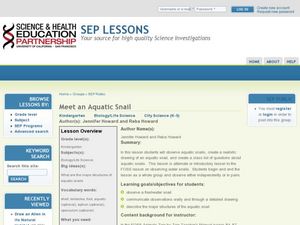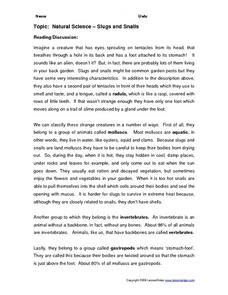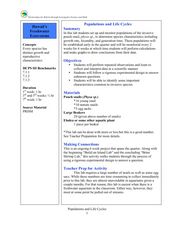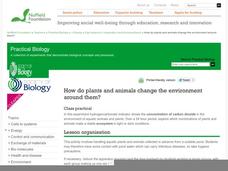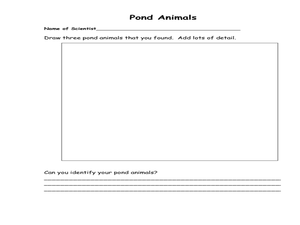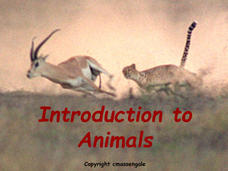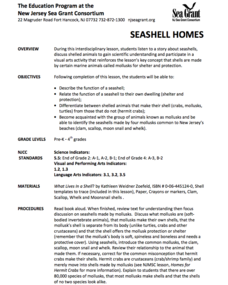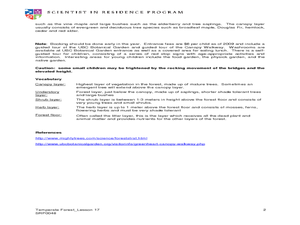Curated OER
Meet an Aquatic Snail
Students explore aquatic snails. In this life science lesson, students create a class list of questions about aquatic snails and begin to observe aquatic snails in the classroom. Students record observations.
Curated OER
Slugs and Snails
Slugs and snails are the focus of this life science worksheet. Student read a selection on these animals, then answer ten comprehension questions. Then, students must draw an "alien portrait" using the characteristics of slugs and snails...
Curated OER
The Wonderful World of Slugs
Examine a slug? Of course, what else would a 2nd grader do with it? Pupils use clues and go on a slug hunt, read a slug story, or make a cooperative group mural of a slug's habitat. While older learners catalog slugs, go on a slug hunt,...
Curated OER
Measuring Aquatic pH
Students apply the scientific method and safety rules to aquatic pH. They test unknown solutions for pH levels.
Curated OER
Populations and Life Cycles
Students explore biology by researching ocean statistics. In this data analysis instructional activity, students conduct a snail examination experiment utilizing live pouch snails. Students collect data about the snails over the course...
Curated OER
Personal Ecosystem
Young scholars build an aquatic ecosystem using large glass pickle jars. In this ecology lesson, students build and ecosystem then observe and collect data on the habitats. In this long term project young scholars observe a population...
Curated OER
Biomanipulation
Young scholars explore the effects of aquatic trophic relationships on water transparency. They observe and explain the effects of reducing nutrient inputs on agal density on water transparency.
Curated OER
How Do Plants and Animals Change the Environment Around Them?
If you have elodea and snails in your classroom aquarium, or if you have access to a pond with these organisms, your young biologists can set up a controlled experiment to determine how certain ecosystems respond in light and dark...
Curated OER
Bottle Habitat
In groups of four, students construct aquatic habitats in pop bottles. They create charts and record data from observations over a four week period. Then they graph their data and write explanations for what they observed.
Curated OER
Life Means Water Environment
Students investigate pH levels in bodies of water and experiment with acid/base reactions. In this water and pH lesson, students observe changes in pH levels of a sample solution and observe a Bronsted-Lowry reaction. Students...
NOAA
Stressed Out!
Are our oceans really suffering due to the choices humans make? The sixth and final installment in the volume of activities challenges research groups to tackle one of six major topics that impact ocean health. After getting to the...
NOAA
Build Your Own Ocean Ecosystem
Hold the sea in the palm of your hand! Amateur oceanographers work together to create models of an ocean ecosystem in the sixth and final installment in a series. Raise awareness of global ocean health issues through guided research,...
Curated OER
Pond and Pond Organisms
Students explore pond ecosystems. In this pond organism activity, students will use pond water and a plastic bad in order to locate and identify freshwater organisms. The activity is designed for younger grades, but includes an...
University of Washington
The Carbon Cycle
When it comes to the carbon cycle, the sky really is the limit. The lesson begins with observing a closed ecosystem in a bottle. Then, scholars discuss and answer questions on the carbon dioxide and oxygen cycles.
Biology Junction
Introduction to Animals
Out of all animals, elephants alone lack the ability to jump. Scholars learn all about animals using a presentation full of fun examples. It describes different types of animals, the biological similarities and differences between...
Curated OER
Seashell Homes
Pupils listen to a story about seashells. They discuss shelled animals. Learners describe the function of seashell. Pupils relate the function of a seashell to their own dwelling. They differentiate between shelled animals that make...
Curated OER
How about a Little Give and Take?
Learners design a closed system to test the relationships between plants and animals. They monitor abiotic fluctuations within this living system by using a chemical test kit. They observe how living organisms respond to fluctuations in...
Curated OER
Land Plants and Algae
Students compare and contrast algae and land plants. In this plant lesson students discover what algae and land plants require for growth. The students discuss experimental design. The students experiment with different treatments of...
Curated OER
Plant Lifecycles
Students examine the life cycle of plants. In this plants lesson, students identify the various stages of plants and their parts. Students compare the life cycle of a plant with that of an animal. Activities suggested can be modified for...
Curated OER
Tree Top Canopy Field Trip
Learners visit the Greenheart Canopy Walkway. For this environmental lesson, students experience a coastal rain forest ecosystem. Learners interact and explore the different layers of the rain forest.
Curated OER
Classifying Commercial Marine Species
Students investigate taxonomy. They explore some of the commercial marine species caught in Magdalena Bay and develop a classification system for presented animals.
Curated OER
Ecosystem In A Bottle
Ecosystem activities show how everyone and everything is interconnected. The smallest change can make a big impact.
Curated OER
Biocomplexity Lab Activity: Measuring Water pH
Students test unknown solutions for pH levels to determine which organism can live in each environment. They name three substances that they think are acids. Students determine a solution is an acid or base. They define the term pH.
Curated OER
Mollusks
In this mollusks worksheet, learners will review the characteristics of the three major classes of mollusks: gastropods, bivalves, and cephalopods. This worksheet has 17 matching, 6 short answer, 9 fill in the blank, and 4 true or false...


